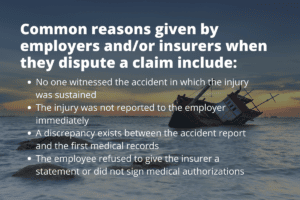Seamen and maritime workers must perform difficult jobs in an environment that is inherently dangerous. As a result, many are injured on the job and must file for compensation under the Jones Act. Because the federal government does not have an especially mandated agency that compels employers to obey Jones Act compensation rules, injured workers often find that their employers and insurers dispute their claims. Frequent types of disputes include denials of liability, rejection of the claim, or stopping payments for necessary medical services or living expenses.

Worries of Maritime Workers Who File Jones Act Claims
Injured seamen have various understandable worries when they file a Jones Act claim with their employers, especially since insurers may dispute it or not provide the proper amount of maintenance and care. These concerns are often justified and include:
- When and how to report their injuries for a maritime/Jones Act claim
- Whether they will get complete and necessary maintenance and cure benefits provided under the Jones Act and maritime law
- What the consequences and costs will be if they file a suit against their maritime employer, including if they will be prevented from working again in the industry
- How to earn income to support themselves and their dependents if they can not keep working in a maritime job
Obstacles Faced by Claimants in Jones Act Claims
All too often, employers and their insurers will look for any way out of paying compensation to an injured seaman, especially maintenance and cure payments. Some may say that they are not liable for the injury and attempt to blame it on a pre-existing medical condition. They may also delay maintenance and cure payments that usually allow workers to return to work even if they are not completely cured. These delays often cause the workers’ injuries to get worse. This prevents the recovering employees from returning to work.
Another tactic used by employers and their insurers is to hire lawyers to investigate the injured employee’s case and find any reason to deny either liability or that the injuries occurred on the job.

Although it is understandable that insurance companies and their policyholders may have legitimate concerns about fraudulent Jones Act claims, their primary concern is to keep their expenses down. Thus, if they can’t deny a claim altogether, they will look for any strategy to minimize their losses, even if it is at the injured worker’s expense.
Settling Disputes
Disputes over Jones Act claims are not simple to resolve. Jones Act cases often involve investigations that are complicated by many factors. Maritime injuries often occur on a vessel out at sea doing its job. This makes preserving the evidence especially difficult since it is impractical to seal off the place where the injury took place so it remains undisturbed.
An injured employee can not handle these complicated cases alone it is necessary to hire a maritime lawyer with knowledge of Jones Act issues to assist in these matters and help to resolve the case as quickly as possible.
The best method in settling a Jones Act claim dispute is to file a lawsuit after recovering from the injuries and trying to resume maritime work. The Jones Act claimant has to prove that the injuries sustained were caused by the employer’s negligence or that the vessel was unseaworthy.
In most cases, these disputes are solved between your maritime attorney and the employer and/or insurance company. However, sometimes neither side can agree on what a fair settlement should be. In such a situation, the dispute must be settled by a state or federal court after a long process.